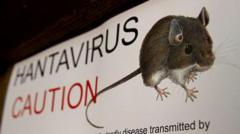In Sarajevo, the struggle against an overwhelming rat infestation has reached a breaking point, as residents document the troubling scenes of rodents swimming in the Miljacka River and overflowing garbage creating a breeding ground for disease. With inefficiencies in public services being a longstanding issue, locals have voiced frustrations over the lack of action to remove decaying animals from parks, prompting health experts to raise alarms about the implications for public health.
This worrying trend has contributed to a spike in rat-related diseases, most notably leptospirosis. Reports from the main hospital indicate that within a single day, a dozen new cases were confirmed, following an uptick of infections earlier this month. Known colloquially as "rat fever", leptospirosis typically spreads from contaminated water or soil, leading to symptoms ranging from fever and muscle pain to severe complications like jaundice and kidney failure.
In response to this alarming situation, local authorities have officially declared an epidemic, enabling them to enforce emergency clean-up initiatives across the city. Additional workers equipped with disinfectant are actively engaged in a public sanitation effort, focusing on high-traffic areas, and schools have been instructed to fortify their own cleanliness protocols for playgrounds and surrounding grounds.
This proactive stance starkly contrasts with the previous two years where pest control measures were virtually non-existent due to bureaucratic setbacks concerning contracts for extermination. Health officials, including Sarajevo Canton Health Minister Enis Hasanovic, have characterized the issue as more than just a health crisis; it is a collective failure to uphold basic hygiene standards.
The situation remains precarious, as former director of Sarajevo's University Clinical Centre, Sebija Izetbegović, warns of the potential for further deterioration with the ongoing rodent population growth. She indicated that the substantial number of well-fed rats could invite additional diseases, such as hantavirus.
Fortunately, while leptospirosis can have a high mortality rate if left untreated, the reported cases to date have not escalated into severe complications. Nevertheless, the community remains on high alert, knowing that the battle against rats and the diseases they carry is far from over.
This worrying trend has contributed to a spike in rat-related diseases, most notably leptospirosis. Reports from the main hospital indicate that within a single day, a dozen new cases were confirmed, following an uptick of infections earlier this month. Known colloquially as "rat fever", leptospirosis typically spreads from contaminated water or soil, leading to symptoms ranging from fever and muscle pain to severe complications like jaundice and kidney failure.
In response to this alarming situation, local authorities have officially declared an epidemic, enabling them to enforce emergency clean-up initiatives across the city. Additional workers equipped with disinfectant are actively engaged in a public sanitation effort, focusing on high-traffic areas, and schools have been instructed to fortify their own cleanliness protocols for playgrounds and surrounding grounds.
This proactive stance starkly contrasts with the previous two years where pest control measures were virtually non-existent due to bureaucratic setbacks concerning contracts for extermination. Health officials, including Sarajevo Canton Health Minister Enis Hasanovic, have characterized the issue as more than just a health crisis; it is a collective failure to uphold basic hygiene standards.
The situation remains precarious, as former director of Sarajevo's University Clinical Centre, Sebija Izetbegović, warns of the potential for further deterioration with the ongoing rodent population growth. She indicated that the substantial number of well-fed rats could invite additional diseases, such as hantavirus.
Fortunately, while leptospirosis can have a high mortality rate if left untreated, the reported cases to date have not escalated into severe complications. Nevertheless, the community remains on high alert, knowing that the battle against rats and the diseases they carry is far from over.
















